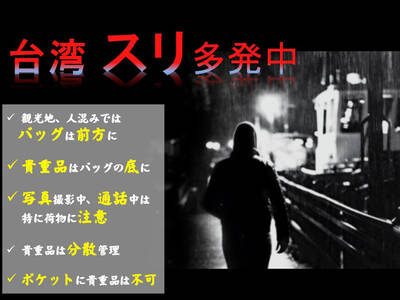A small black mosquito has become a serious environmental problem in Taiwan, officials said yesterday.
Mosquito control programs in 11 counties will receive further subsidies from the Environmental Protection Administration (EPA) in an attempt to stamp out the annoying little mosquito this winter.
The mosquito, forcipomyia taiwana, and similar species are quite common in Taiwan and southern China.
Although it does not carry diseases, its bite leaves people with red, swollen spots, which are almost too itchy to endure.
Last year, the EPA began subsidizing 11 rural counties to tackle the small black mosquito by spraying pesticides and helping residents to clean up their environment. The mosquito-prevention program will be further enhanced between next month and next March in an attempt to eliminate the larvae. The mosquitoes breed during winter and early spring.
According to Ho Soon-ching (
"Spraying pesticides is only part of the solution. The only effective way of getting rid of this mosquito is removal of the breeding sites," Ho said at a press conference yesterday.
Forcipomyia taiwana has long been known by names such as "small black mosquito" and "little King Kong." The size of the mosquito, which has dark and hairy wings, is about 1.4mm, or one-third the size of a sesame seed.
Humid places, such as the soil in tea gardens, vegetable farms and bamboo forests, are ideal breeding sites for the mosquito. The mosquito is most active during the middle of the day, rather than at night.
Japanese scientists first discovered the species in Taichung County in 1913. Ecological research on the mosquito was not carried out until two decades ago.
Due to recent human development in remote areas, betel nut plantations now provide the mosquito with ideal breeding sites, EPA officials said. It is now annoying residents of Taichung, Hsinchu, Miaoli, Nantou, Changhua, Yunlin, Chiayi, Tainan, Pintung and Hualien Counties.
Ho said that local environmental bureaus would help with clean-ups in towns as well as rivers. The EPA will also distribute peppermint oil and other remedies to residents.

The Japan-Taiwan Exchange Association has cautioned Japanese travelers to be vigilant against pickpockets at several popular tourist spots in Taiwan, including Taipei’s night markets, the Yongkang Street area, Zhongshan MRT Station, and Jiufen (九份) in New Taipei City. The advisory, titled “Recent Development of Concerns,” was posted on the association’s Web site under its safety and emergency report section. It urges travelers to keep backpacks fully zipped and carried in front, with valuables placed at the bottom of the bag. Visitors are advised to be especially mindful of their belongings when taking photos or speaking on the phone, avoid storing wallets and

ENDORSING TAIWAN: Honduran presidential candidate Nasry Afura said that Honduras was ‘100 times better off’ when it was allied with Taipei The Ministry of Foreign Affairs yesterday said it would explore the possibility of restoring diplomatic relations with Honduras based on the principle of maintaining national interests and dignity. The ministry made the remarks in response to reporters’ questions regarding an article titled: “Will Taiwan Regain a Diplomatic Ally?” published in The Diplomat on Saturday. The article said Honduras’ presidential election in November could offer Taiwan the chance to regain an ally, as multiple candidates have promoted re-establishing diplomatic relations with Taiwan. Honduras severed diplomatic ties with Taiwan in March 2023 in favor of Beijing, but since switching its diplomatic recognition,

Scoot announced yesterday that starting in October, it would increase flights between Taipei and Japan’s Narita airport and Hokkaido, and between Singapore and Taipei. The low-cost airline, a subsidiary of Singapore Airlines, also said it would launch flights to Chiang Rai in Thailand, Okinawa and Tokyo’s Haneda airport between December and March next year. Flights between Singapore and Chiang Rai would begin on Jan. 1, with five flights per week operated by an Embraer E190-E2 aircraft, Scoot said. Flights between Singapore and Okinawa would begin on Dec. 15, with three flights per week operated by Airbus A320 aircraft, the airline said. Services between Singapore

A fourth public debate was held today about restarting the recently decommissioned Ma-anshan Nuclear Power Plant, ahead of a referendum on the controversial issue to be held in less than two weeks. A referendum on Aug. 23 is to ask voters if they agree that “the Ma-anshan Nuclear Power Plant should continue operations upon approval by the competent authority and confirmation that there are no safety concerns.” Anyone over 18 years of age can vote in the referendum. The vote comes just three months after its final reactor shut down, officially making Taiwan nuclear-free. Taiwan People’s Party Chairman Huang Kuo-chang (黃國昌) represented